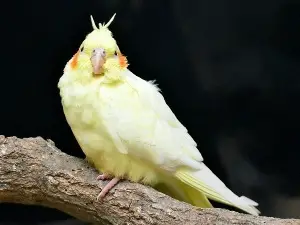
Making sure that your baby cockatiel eats the right formula, and enough formula, is a must. But your baby bird may not always want to eat its formula.
This article looks into why your baby cockatiel is not eating formula
Table of Contents
Baby cockatiel not eating formula:
Baby cockatiels love to eat, they will gobble up almost anything you give them and this food will help them grow.
If your baby cockatiel isn’t gobbling up its formula here is why:
The crop is full:
The bird may not be eating its formula because it recently ate and its crop has not gone down.
Birds have an organ called a crop at the base of their throats. The crop stores food before the food is moved into the bird’s stomach.
If the crop has not been emptied and food has not moved into the bird’s stomach then your baby cockatiel will not try to eat food, beg for food, and will refuse formula.
What to do:
The crop will eventually go down and send its contents into the bird’s stomach so you don’t have anything to worry about.
You can leave the bird alone, the bird is fine and the food in its stomach should go down, and the bird’s crop will go down.
The crop will be almost completely empty before the bird goes to eat more food.
The bird is weaning:
If your baby bird is starting to refuse its formula then it may be weaning itself.
Weaning is when the bird stops eating formula and moves on to a diet of water and real food.
The weaning bird will pick at real food sources over time and will eat less and less formula.
What to do:
If you start to see this then you can start giving adult bird food to the bird and start cutting back on the amount of formula that you’re giving your baby cockatiel.
The bird is sick:
Another reason why your baby bird may not be eating its feed may be that the bird is sick.
Your baby cockatiel may be suffering from any number of illnesses and many illnesses will cause the bird to not want to eat.
If the bird is sick then it will start to show other symptoms as the illness progresses.
What to do:
Because there are so many illnesses that your baby bird may be suffering from the best course of action would be to have a vet, better yet, an avian vet, examine, diagnose, and treat the bird.
An at home diagnosis and treatment can be helpful to some birds but seeking professional advice is preferred.
The little bird can be kept isolated and be given its own food and water while in isolation.
What not to do:
The baby bird may not be eating its formula, and you may be worried, but this isn’t a good enough reason to force-feed the bird.
Force-feeding the bird can get very dangerous as it can cause vomiting or aspiration in the bird, which can kill the little bird.
Because of this, avoid force-feeding the bird
If you enjoyed this article then you may also be interested in other bird related articles. Here are some articles that you may be interested in: Why Is My Budgie Always Tired?, My Budgie Just Sits There, Chicken Throwing Up Green Liquid, Why Is My Chicken Gulping?, Cockatiel Not Eating And Sleeping, How To Know If Your Baby Cockatiel Is Hungry, Can You Overfeed A Baby Cockatiel?

